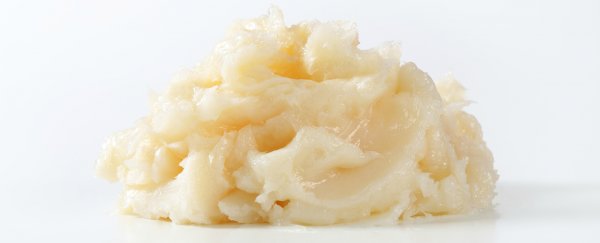An experimental weight-loss drug that aims to help people burn fat has been trialled in mice, and the results suggest that it successfully boosts their metabolisms and helps them lose weight.
Known as GC-1, the drug sheds weight by turning it from 'bad' white fat into 'good' brown-like fat, which burns up energy.
"GC-1 dramatically increases the metabolic rate, essentially converting white fat, which stores excess calories and is associated with obesity and metabolic disease, into a fat like calorie-burning brown fat," lead researcher Kevin Phillips from the Houston Methodist Research Institute in the US said in a press release.
Although white fat helps us regulate our body temperature, Phillips calls it a "metabolic villain" when people build up too much of it. On the other hand, research has shown that people with more brown fat have a reduced risk of diabetes and obesity.
CG-1 turns white fat into brown fat by activating the receptors for thyroid hormone - a hormone that plays an important role in regulating the body's metabolism and is involved in converting excess energy into heat. It's has now been tested on hundreds of mice that have either diet-induced obesity or genetic obesity.
After taking the drug daily for approximately two weeks, genetically obese mice lost weight and also more than 50 percent of their fat mass. Mice that were obese as a result of their diets had a similar response, the researchers explain. They will be presenting their results this Friday at the Endocrine Society's 97th annual meeting in San Diego, US.
Mice that had been treated with the drug also had much better insulin sensitivity, in some cases as much as a six-fold improvement was seen, which suggests CG-1 is also protecting against diabetes.
Further tests on fat cells grown in a petri dish, as well as the fat tissue taken from mice, showed that the drug was converting the white fat into brown fat.
"Our data demonstrate that GC-1 is a novel fat-browning agent that may have use in the treatment of obesity and metabolic disease," Phillips said in the release. The news comes just a few days after researchers announced they'd found a hormone that mimics the effects of exercise - no lycra required.
CG-1 hasn't been tested as a weight loss treatment in humans as yet, but it is currently undergoing clinical trials for its ability to lower cholesterol under the name sobetirome. The drug would need to be taken in much higher doses in order to trigger weight loss, Phillips explains, but the initial testing will help determine whether the drug is effective and safe in humans.
